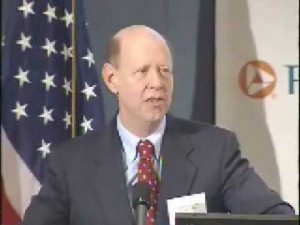Steuerle: We Need Health Budget Caps
 Gene Steuerle writes at The American Square:
Gene Steuerle writes at The American Square:
President Barack Obama and House Budget Committee Chairman Paul Ryan (R) have laid out different approaches for curbing growth in health care costs. One would empower government-appointed officials to constrain health prices and services by, for instance, strengthening the power of the Independent Payment Advisory Board (IPAB) created in 2010’s health-reform legislation. The other would provide Americans with premium support up to some dollar limit to cover their health insurance purchases. Both count on efficiency improvements as well. The political debates have quickly centered over whether Obama is heading toward ever-more cumbersome government regulation and price-setting and whether Ryan is opening up unregulated markets that would deprive many of needed health care.
It’s not that simple, though. Three questions are actually at issue:
- How should budget constraints be applied?
- Should automatic budget growth for health care programs (particularly, Medicare) finally be reined in?
- Should government health program budgets be limited even if neither side gets its way on question 1?
The president and the House Budget Committee chair disagree on the answer to the vital first question (which I’m not going to address). But President Obama and Chairman Ryan have more in common than first meets the eye. They face similar hostile fire and essentially jump into the same foxhole by answering, “Yes” to question 2. And, I conclude that until question 3 is answered with a firm “Yes,” they’ll probably never get out of the foxhole, obtain real budget discipline in health care, and achieve the efficiencies in health care delivery they are seeking.
Why are the president and the chairman coming to similar conclusions on getting health care into a budget? Unlike most government programs, government health programs—notably Medicare for the elderly and tax subsidies for the nonelderly—typically have squishy open-ended budgets. You and I and our doctors basically decide what everyone else should contribute to our well-being. In a sense, every time we mutually agree to some procedure or decide to try some drug, we’re voting to increase others’ taxes or premiums—often, to the benefit of providers and at no marginal cost to us. (This original sin of health insurance design also distorts decisions within the health care sector by, for instance, favoring chronic care over cures and specialization over general practice.)
Absolving that original sin requires operating alternative health care programs within a limited budget. Keep in mind that such budgets can be increased, but then they have to compete with other budget priorities. But if you simply compare a higher open-ended budget with a lower limited budget, the first will always look richer—providing more services to patients and compensating providers better. That’s the simplest explanation for why New York Times reporter Robert Pear finds that many Democrats and Republicans oppose President Obama’s effort to strengthen an independent board. And it’s the simplest explanation for why many Democrats oppose Congressman Ryan’s plan. Both approaches create losers relative to current law, and politicians hate picking the losers.
Yet, each approach could have exactly the same budget. In other words, the choice between approaches has nothing to do with which one reduces spending growth rates the most.
This takes us to question 3. While we squabble over which approach to take, the open-ended health budget is partly responsible for the potential downgrading of U.S. government debt, excessive borrowing from China and other countries, and the scheduled starvation of education, transportation, children’s programs and other public goods that don’t have open-ended, automatic growth built into them. As health care’s share of total spending or revenues goes up, other shares must go down: essentially, our current health policy depends on either robbing Peter to pay Paul or borrowing from Wen Jiabao.
What’s more, neither side will probably ever prevail entirely.
Click here to read more.

